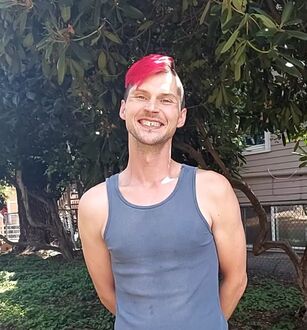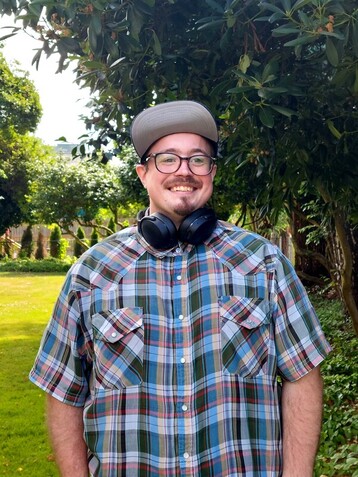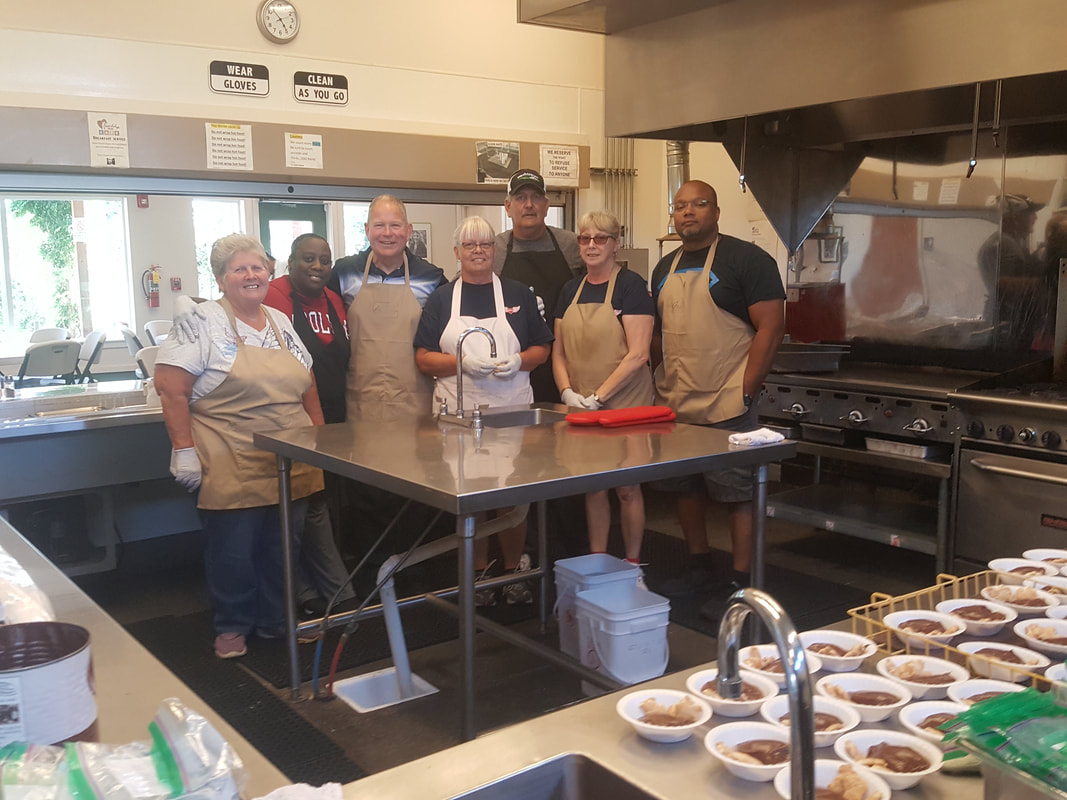Substance abuse had been a part of his life since he was a child. Between his mental health and addiction, things had come to a head and he went to treatment. In 2017, John was staying with his brother. He relapsed and fell back into the cycle again; due to this, he was asked to leave. His sister-in-law pointed him to the Friendship House. His first stay here was early in 2018, but struggled to maintain his sobriety. He lived in a tent for 6 months, and commented on being grateful for the summer weather. He was unsheltered off and on. Staying on couches sometimes left him at a place where he relied on others who had taken advantage of his vulnerable situation. He knew he had to leave. Again, John came to the Friendship House. He claims he was a mess while using and camping. Mental illness was detrimental to his state of wellness and John is very aware he came off incoherent to most people. Those who were close and patient were able to get through and connect with him. One of those people had Kristie Kaaland, the Men’s House Manager of 11.5 years. “Kristie will absolutely do anything in her power if she can see you have gratitude and are genuine," said John. He credits her support as a major factor in his turnaround, as well as having a safe place to stay. He claims he would never have found employment had he not been able to have his most basic needs met at the Friendship House. Employment can feel out of reach without sleep, a shower, clean clothing and something to eat. By spring of 2019, John had moved on to an Oxford house, a clean and sober shared living space for those in recovery. 6 months after that he was in a home of his own, along with his partner. He is back to roasting coffee again, this time with Fidalgo Coffee Roasters. He “Absolutely loves it” there. When asked what he needed to succeed his very quick answer was going to meetings to maintain sobriety, even if it is inconsistent at first. “a lot of people come in and out for a while, which is what I did” “the thing is, even with people who come in and out, they are able to get 6 months here, 8 months there” He stated earnestly. “It opened my eyes to who I am and what my patterns are,” said John in reference for being accountable for his habits. “I’m not here because my brother kicked me out. I am here because I was stealing from my brother and getting loaded”. Being an unsheltered person is an overwhelming experience. Trying to make leaps and bounds to change your life through various organizations, programs, support groups, and counseling can be dizzying on top of struggling to get your most basic needs met. When asked what he wishes he could tell the public in regards to the unsheltered people in the community, he shared “A lot of people, their view on homeless folks, is that they are 100% homeless because they can't stop using drugs, but I think a lot of folks get high because they are homeless” “I had a great job, I could support myself” –when using, but “It’s a cycle that is really difficult to get out of” We are beyond proud of him for breaking that cycle. John’s hopes to volunteer his time at the friendship house as a way to support others trying to better their lives. In one of his support groups, he found himself sponsoring someone who was in a similar situation to his own. His advice to others going through a similar path is to work hard, be focused, be grateful, have grace, and you will succeed. Author Rayna Huitt, Office Associate
0 Comments
Meet Lewis. Lewis is 31, and has been homeless repeatedly since the age of 18. The last time he was homeless started about a month and a half before he was in our shelter. For the last four years, he was couch surfing, sleeping outside, at drop in centers, and temporarily was staying with a friend. When asked what it was all like, Lewis Replied, “Utterly chaotic. I just could not get a leg up. Was okay with it until I had to make a change. At drop in shelters you feel like a street mentality, get in altercations, feel disrespected and many people were using making it hard to stay sober.” Although he had slept outside multiple times before, he was living on the streets for two weeks straight before getting a bed in the Men’s House. “This area is my home and I wanted to make it work here,” Lewis told me. He feels like he has a net of support here. He had to make it work in Skagit County. There was a lot needing to change in Lewis’s life, and when reflecting he referred to his feelings as “the gift of desperation”. His family knew about the Friendship House, and friends knew about the meals and had brought him to dinner at our café. The first time he tried to make sobriety work he came here but moved out into a friend’s house. This current stay was his first time doing the 90 days and he feels it has greatly influenced and changed his life. Regarding his time with us, Lewis says he appreciated the room to grow, the responsibilities he had received and the progress he made. During his stay, he was able to get a better grasp on his mental health. Finally, he was on stable meds, which would not have happened without Kristie guiding him. His attitude towards life has changed. He can handle stressful situations so much better. Part of this growth was from gaining insight through his experiences at the men’s house. As alcohol worked its way out of his life, positive mental health, counseling and hobbies worked their way into his life. All the stuff he used to love doing came back to him. Skating, drawing, writing, photography, Magic: The Gathering. Something he wishes people knew about being homeless is that you become a product of your environment. If no one cares about you, you don’t care about yourself or try to make yourself better or change. It takes a considerable effort to get out of homelessness and that unhealthy hole. To create change in one’s life you need stability, guidance, and someone to care and facilitate the effort to change. Here Lewis received one on one time with the shelter manager, guidance, tips, links to resources, and support. “I’m extremely grateful for the opportunity friendship house has given me to improve my life” Lewis shared. June 1st Lewis was accepted into an Oxford House, which is a shared sober living space. When he is comfortable in his role at the Oxford House, he is looking to volunteer his time and give back here at the Friendship House. When asked what is next for him, Lewis listed the following: his license, a car, being employable, stability, finding a job, and developing new skills. We applaud you success, and are eager to see what is next for you! Author, Rayna HuittFriendship House Office Assistant 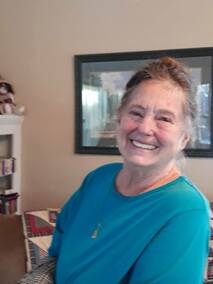 Janet (Rusty) Desherlia Rusty is one of our amazing selfless volunteers who, at the age of 81, donates her time to the community twice a week at the Friendship House in hopes of teaching sign language and spreading information about the hard of hearing and death culture to our staff and residents. -What got you involved? I’ve always been a big believer of giving back but how I got involved with the friendship house I can’t exactly remember, although its been almost two years. I just like to hear the acts of kindness today, I’m tired of hearing about all the violence and hate so i thought "Why not go out and help in the community". When I first got here there was another AmeriCorps VISTA named Chris and I was excited to talk to him because I also served as a VISTA almost 50 years ago in 1956. I believe that I brought some stuff over to donate when i found out that there was someone hard of hearing staying at the friendship house. That's when i thought, "why don’t I teach your staff and volunteers sign language to help them connect with the hard of hearing community. I don’t have money to give away, but i would love to give my time." What got you into teaching American Sign Language? It all started about 40 years ago after I finished my VISTA term and I was dating someone who signed, and I thought that that would be cool to learn. They had just begun the first sign language class in Tacoma, so I took the class and it was so big that the second week she had to divide it into two. I went up to the teacher saying” I need more help, can I come to both your classes”. The teacher and i became best friends from that day on. Next, I started to volunteer as a teacher aid at the high school to get more experience signing. Next, i went to Marysville college to get my interpreting degree. Eventually I started interpreting at the Pacific Lutheran University and then I started the sign language classes and taught for 13 years there. -What is your favorite part? My favorite part is you guys and what you do here. “I just think that its really nice that people have some place to go when they have no where else to turn to. I really think that there is always a lot of volunteers here and you guys are always giving back, and I truly appreciate that. You try and it shows." -What is your biggest take away from all of this? I just appreciate being able to be of some help and getting people comfortable with sign language. More and more people are going deaf now a days so I think its important that the community becomes more willing to connect with them -Comments? I think the Friendship house is a great place and I believe that we are all blessed to have it here. 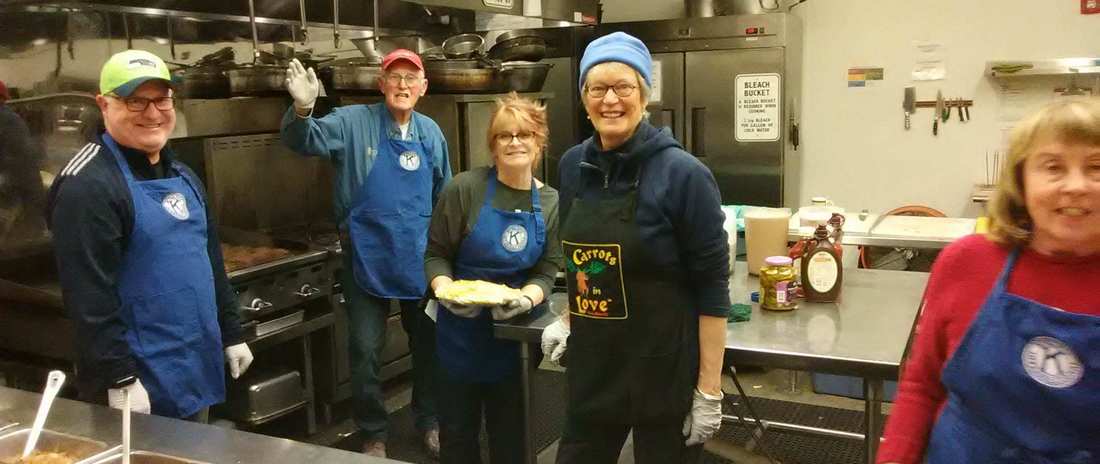 Karen Parnell Chair of services committee Kathy Brown Chair of Resources planning How long have you been involved with Friendship House and when do you volunteer? “One of our major pieces of involvement is the monthly meal service on the third Thursday of the month. I actively recruit volunteers and get people signed up and I often volunteer myself. We have worked often with jerry shacket who has helped us to modify the menu to make it more nutritious and cut down cost, “said Karen. Kathy has been a great help buying the supplies for us “I’ve even been asking people in the community that want to donate things like food, mugs and bowls, just things to make it nicer,” added Kathy. What got you involved? Kiwanis became involved with the Friendship House over 25 years ago and Karen has been involved since around 1995. Kiwanis has have been doing the hamburger supper actively since then. When she joined Kiwanis community service committee and saw the value of feeding people and how much pride that the club takes in it is when she decided to help out. Main dish? Karen went on to tell me about the main meal that they serve every third Wednesday. “We have always served grilled hamburgers with grilled onion and the cheese that they want. That has been the core menu item for almost 25 years, but we’ve modified it slightly in the past year. we went from doing the conventional white hamburger burns to the whole wheat flat bun. We’ve loped off potato chips at jerry’s, the Development and outreach manager, recommendation and we decided to add beans. We also offer fruit and different veggies that we get from the food distribution center in the summer times. we do not give soda anymore, we just give out milk or orange juice and people seem to like it better. We even offer chocolate milk sometimes and people love it. What we have really done is increased the protein of the meal and decreased the empty calories in order to feed people with more nutritious meals. We believe that this creates habits in people and shows them different choices to say that this is better than that, it will be healthier, and enjoyable. We also try to include a fresh fruit.” What is your favorite part? Karen said, “We love what we do. I think that my favorite part is working with the families that come through the kitchen and giving a smile to people”. Kathie’s response was “I am an animal lover and I enjoy feeding the dogs. Sometimes I take dog food and little packages I get or sometimes they are fed leftovers.” what changes have you seen? Karen expressed that “Changing from the old kitchen in the men’s house where the cooking used to be to the new café. it really is nice to have a larger dinning area that does a nicer job with a congregate meal, plus the beautiful herbs that they grow outside and the outside space that they have to relax in. I think that that has been a big impact. I know the architect who designed the café and I think that he did such a great job. And it’s nice to see the comradery that people have around that place.” Kathy “one time for someone’s birthday they sang happy birthday in English and in Spanish. It was a dreary winter day but that was so heart warming to be a part of.” Challenges? The main concern that Karen spoke of was about the neighbors that were bringing up issues and some of the discussions around encouraging the idea that meals should not be served to families of the communities. “It was slightly disturbing but came out of concern for drug problems in the homeless community. some of our club members were worried that what we were doing would attract problems because we just want to help, and we are proud of what we do but if they stop serving the community then we may have to drop or decrease our services.” How do you supply and sustain this? Karen went on to say “We earn money at our fundraiser, the Salmon BBQ, and then allocate are funds through each club. We also bring in many club members who will bring in their spouses, their children and their friends and everybody has a ball. To keep it organized we always promote our calendar at the meetings and request that new comers get out into the neighborhood and join us. Some people due to family needs are unable to come out and volunteer. We actually have done a program with jerry shacket with a slideshow to show other members what is going on, that’s how we bring the story to the club to the people who cannot do it, but we haven’t done that in a while." What is your biggest take away from all of this? Karen, “For me, the biggest take away from working with low income families just keeps reminding me that there are needs out there and we need to try to help regardless and that just continues to be my take away.” Kathy, “mine is that there is even more of a need for it today then there used to be”. (Interview)
Mount Vernon Grace Church (Lauri Haug) How long have you been involved with Friendship House and when do you volunteer? we serve on the first Friday of every month. Grace church has been around for about eleven years but the previous church that we attended (Bethel Church Sedro-Woolley) did Friday dinners with the Friendship House café for a few years before it was disbanded. In the beginning days of grace church, we thought ““hey, we should volunteer at Friendship House again””, so grace church has been volunteering at the café most of the time since then except for one short period of time. I, personally, have been involved with the Friendship House for about 10 years but other members of our church were there for the entire transition from Bethel to Grace church. Main dish? Our main meal changes every month depending on the season, for example in June or July we will serve hamburgers or hot dogs with potato salad. Sometimes in the holiday season around November and December, we serve tater-tot casserole, turkey pot-pie, Ham and things like that. We always serve a dessert along with a bible verse of good prayer but instead of giving it out in the line we personally pass out the deserts individually to the patrons at their table, we try to get around and make sure that everybody is doing ok. What got you involved? We thought about starting a soup kitchen at our church. We were going to buy a building that could be used for this service, it had a dishwasher, service counter, oven and a lot of the stuff that you would need but it wasn’t complete. In the end, we never got that far, and we decided to start back at Friendship House. When I began, I was really surprised at how many churches and different groups donate food and time there, it was really encouraging. Even the funeral home, if there is anything left after the service they will pack it all up and bring it here and that’s just great because it is all helpful. What is your favorite part? Seeing the expressions on the faces from what we are serving and that they really appreciate it, that is the most rewarding part. We really hope to make everyone who comes for a meal to feel special, because they are special. We put centerpieces on their table with decorations and bring the dessert directly to them to show that people care, and it just brings a wonderful presence in that room and you can tell just by the conversations going on how appreciative everyone is. For me, my favorite part is serving that meal and seeing someone coming back to say thank you, even if they don’t speak English they just give you two thumbs up, that means it was good and that’s important. One of those makes up for everything, it is good and its good for us to do this too. It's rewarding you know, it's not a one-way street. When you help somebody else you get it back. what changes have you seen? The new café has made a big difference for us and I know that it makes a big difference for training people because it is so much more like a kitchen. In the old one if you had like 6 people it was too much and we were tripping over each other. Trying to get around to open the oven and the oven is right there on the serving counter. And on the other side of the counter, they fit 16 people in that tiny room. I was saddened by the news that Friendship House would no longer be serving Breakfast and lunch because I believe that if the people need 3 meals a day we should serve it. No matter your status and situation nobody can do any good on an empty stomach. If you think that you are going to get a perfect class of people when you are serving the homeless, your wrong. But they are god’s children and whatever stage of their life that they are in they need to be helped and served. We need to give them hope and some sort of stability to help them get started on a positive routine. Challenges? One time when the pastor was working with us at the old kitchen, there were about five of us and we were putting the meal together and started putting everything together to go but everyone had to leave because they had other obligations afterward or they just came to cook and that was it. but the pastor said, I'm here. I'm not sure how many we served that night, but we did it ourselves, just the two of us, so it was interesting. Sometimes staff in our group is just thin and that makes it hard to do the first Friday around summer time and holidays because everybody is going to be gone for the weekend. There was one time we scared the kitchen manager, tom. It was getting close to The Fourth of July, we called tom and said” well, I hate to have to tell you this, but we can't do this Friday the fourth of July because everyone is going to be gone. We decided that we could just give the donation of the food for that day to him and he was happy to work with that. I wasn’t trying to tell him that we were going to leave him out in the cold, so we just took up an offering and everyone at our church was generous, and we were able to buy everything and drop it off, it was nice. That doesn’t happen very often that we have to cancel, and we hope to never have to do it again but we think we know what’s going to happen, but we really don’t. How do you supply and sustain this? Kathy Brown here is one of seven of our Community Services Committee members, and is our primary shopper for our monthly FH dinner. I think the biggest challenge is that often people get to busy in their own lives and they don’t stop to set time aside for somebody else, unintentionally, it just happens. Sometimes its family matters sometimes it is staffing. We like to be able to come in, start early in the morning to get groceries. Then some will go to lunch and others will come to help clear it but to get the whole thing from beginning to end we are sometimes a little short on the service part. We would like to be able to do it all, buy it, prepare it, serve it, without asking for help but sometimes were shy on volunteers. that’s the biggest challenge I think sometimes but we have a pretty solid team at the moment. I'd love to have an alternating schedule so that we can say, “hey, this week so and so will be serving, if you can’t serve just let me know and we’ll get somebody to cover it for you. For now, we just pass round a sign-up sheet and that sometimes gets people motivated. We haven’t pushed the signup sheet lately because we have a solid group. When we take up the offering we declare publicly that if you'd like to help prep be there at 2:30 and if you want to help serve then be there at 4:30. That usually gets everyone's attention to contact Lauri, but we've got about 6 of us who are full time on it. well, just one Friday a month, and it’s good to sacrifice something for everyone else in the world to make it a better world What is your biggest take away from all of this? There was a time when our pastor, he ran into a lady that he knew while serving dessert and he said “you never know who you are going to meet here. she was a fairly wealthy woman with a couple of homes and she lost everything. Now she’s her at the Friendship House eating dinner”. So, he sat down and prayed with her. It can happen to anyone, anybody can be in this situation. |
Friendship HouseFollow our blog to read success stories and keep up to date on current information. Archives
November 2022
Categories |
Reflecting the heart of God by feeding, sheltering, clothing and healing those in need.
|
|
Our work is made possible in part, by these generous community partners:

 RSS Feed
RSS Feed
